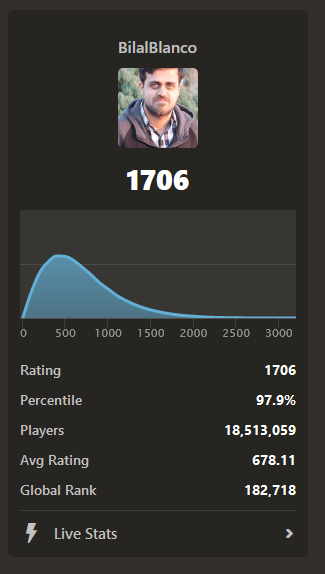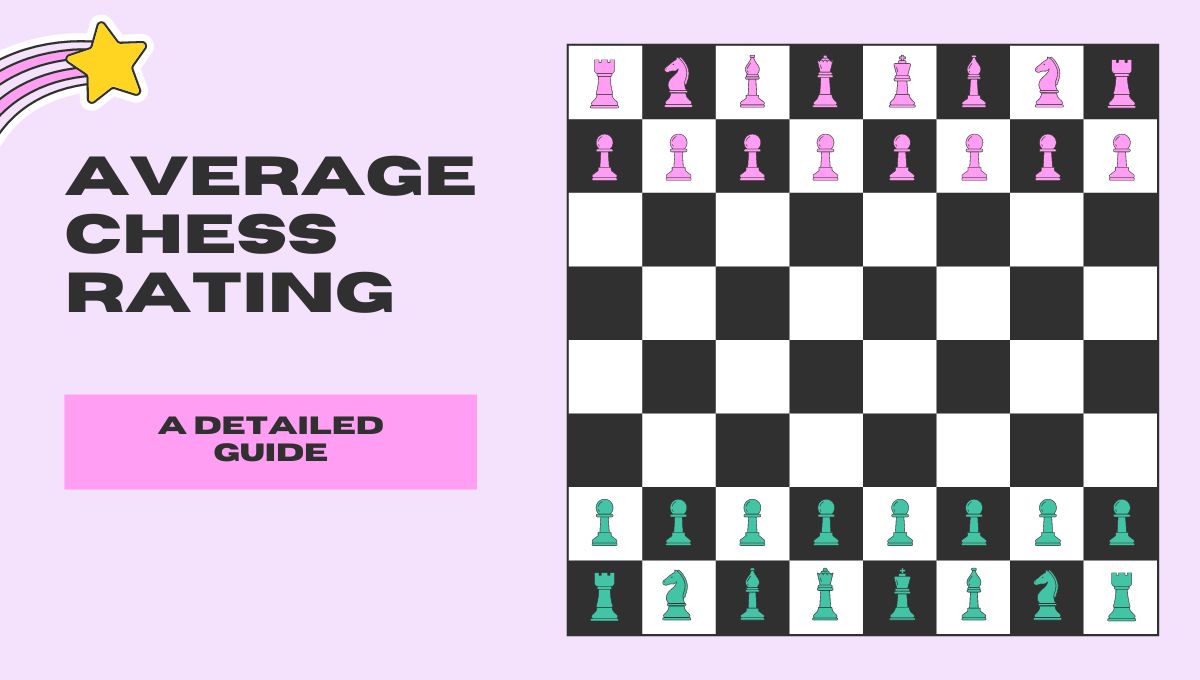The average chess rating is between 400-500 according to data from the largest chess platform, chess.com.
While this may seem low, the rating graph on the website indicates that this falls within the 50th percentile, based on a bell curve of player ratings.
The awkward thing is that 97.9% of players are rated 1706 or below, while only eight players are rated 3200 and above, making them the best of the best.
You can see that in the screenshot of my rating below:

Why are so many people bad at chess?
Most chess players are bad at it because they never log in again after playing once or because they have no interest in the game and play only once or twice a year.
However, if you play regularly—two or three times a week, for example—you can easily improve and achieve a rating of 1100-1200.
You can do that without necessarily analyzing your games, solving tactics, or studying openings.
Why do some people never improve at chess?
Some people never improve at chess because improvement is often a psychological matter.
Some players struggle to improve because they over complicate the game in their minds, thinking that it can only be mastered by a select few.
They may analyze their games thoroughly, but they give up too easily during live play.
On the other hand, when it comes to game play, there are three major reasons why people often struggle with chess:
- Lack of understanding of chess openings, resulting in repetitive mistakes and a lack of logical explanation for their moves.
- Failure to implement knowledge gained from chess courses and online videos into their actual games.
- Tendency to play in short bursts without any long-term planning.
Levy Rozman has provided a detailed explanation of these three issues in a video, which you can find below:
What is a respectable chess rating?
1200 is a good enough and respectable rating to win amateur chess games like games against your friends and family. However, if your plan is to participate in a local swiss system tournament or a round-robin tournament with a rating of 1200, you may only score 1/5 or 2/5 if you get paired with easy opponent more than once.
Based on my personal experience with local amateur tournaments that are not FIDE rated or affiliated with any major chess organization, a rating of at least 1700 is typically necessary to win four out of five games and finish in the top ten.
If you want to improve your chess game and reach that 1700 rating, be sure to check out my article “Chess Openings for 1700 Rated Players“.
It offers valuable insights on how to overcome the common challenges that lower-rated players face.
Countries that have a better average chess rating:
While there is no official data on average chess ratings by country, it is widely believed that ratings in Eastern Europe are generally higher.
For instance, in Hungary, chess is taught as a subject in schools, resulting in a more chess-educated population compared to the rest of the world.
In terms of top chess players, Russia stands head and shoulders above everyone else, boasting 256 active Grandmasters, the highest number in the world.
In comparison, the USA has 101 Grandmasters, and Germany comes in third with 96.
You can find the full list of titled players on the World Chess Federation’s website.
India also ranks high, with their club-level players typically having ratings of 1900 or higher, which is notably above the global average. In summary, it’s Russia, India, and countries in Eastern Europe that typically have higher average chess ratings.
While there is more money in chess compared to other board games, it still may not be enough to attract people in Western Europe, Canada, the USA, and Australia to take up chess. This may explain why average chess ratings in these regions tend to be lower.
How to Improve Your Chess Rating: Tips and Strategies
Here are some possible tips and strategies to improve your chess rating:
- Practice consistently: To improve your chess skills, it’s important to set aside a regular time each day or week to play and study chess. Make sure you stick to your schedule and avoid missing practice sessions.
- Analyze your games thoroughly: Reviewing your games is an effective way to identify your strengths and weaknesses and learn from your mistakes. Take the time to analyze your games carefully and look for areas where you can improve.
- Master chess openings: Knowing the basic principles of chess openings can give you an advantage and help you avoid blunders. Make sure you study openings thoroughly and understand the strategies behind them.
- Sharpen your tactical skills: Solving chess puzzles can help you to improve your calculation and pattern recognition skills. Practice solving puzzles regularly to hone your tactical abilities.
- Challenge yourself: Playing against stronger opponents is a great way to push yourself and improve your strategic and tactical skills. Look for opportunities to play against stronger players, whether online or in-person.
- Expand your knowledge: Reading books written by experienced chess players can provide you with valuable insights and new strategies to improve your game. Make sure you read widely and stay up-to-date with the latest developments in chess theory.
- Test your skills: Participating in chess tournaments is an excellent way to gain experience and test your skills against a variety of opponents. Look for local tournaments or join online competitions to get started.
- Get professional guidance: A chess coach can provide you with personalized feedback and guidance to help you improve your weaknesses and refine your strengths. Consider hiring a coach to take your game to the next level.
Final Word:
Improving your chess rating is a journey that requires dedication and constant work.
It is quite clear that the average chess rating is far from the initial rating of 800 typically given on chess platforms; it should be considerably higher than 400-500.
By applying the tips and strategies outlined in this article, you can significantly increase your chances of joining the top 2% of chess players worldwide.
To enhance your chess skills and achieve your goals, focus on building a strong foundation.
